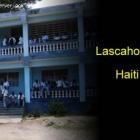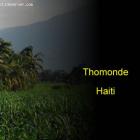ADVERTISEMENT
Reforestation in Haiti: A Necessity for Survival
Reforestation in Haiti: A Necessity for Survival
Today, less than 2 percent of the Haitian forest is still standing.
The deforestation of Haiti's large hillsides have allowed rainwater to run off towards communities located at the bottom of the slopes, with the result that year after year, the country suffered from flooding disasters.
These floods disasters are not natural-caused, but primarily human-caused disasters, and have killed thousands of people.
Why?
Haiti is located in the path of tropical storms and hurricanes.
With 76% of Haitians relying on charcoal for cooking fuel, the destruction of the Haitian forest and the resulting ecological damage are indeed ongoing problems.
The denuded mountain slopes are washed with rainwater and looses their top soil, making them unsuitable for any type crops growing.
It is not by accident Haiti produces less than 50 % of the food it needs to feed its people.
As the new leader of Haiti, President Martelly must not only address this fundamentally urgent problem of deforestation, but needs to promote the use of alternative fuels, if he wants the country's his long-term and durable development strategies to work. This is a Haitian problem and requires that each and every Haitian to personally get involved with the reforestation efforts for a true long term solution.
The deforestation of Haiti is such an urgent concern that the US government has enacted a law, "The Haiti Reforestation Act of 2010", and over the next five years, will provide financial assistance for reforestation efforts in view to restoring 20% of Haiti's tropical forest that existed in 1990. This requires the planting of 25 million trees.
Interestingly, as recently as 1980, Haiti had 25% of its forest.
Today's reality is different and one needs to think past this massive deforestation and of the clearing of vast areas for conversion to agriculture.
Haitian authorities can no longer afford to ignore this major problem.
The reforestation is not just essential but critical for restoring crops output, creating jobs, stop the degradation of the environment while reducing the rate of soil loss. It has also affected the quality and quantity of the available fresh and clean drinking water, whereas the ecological destruction has resulted in serious degradation of human habitation.
Haitians must be part of the solution to this problem.
The US reforestation program is a good start but wholly insufficient.
All Haitians, including the very young, should be involved in a tree planting reforestation project.
From this "Renaissance of Haiti" that's about to begin, President Martelly could bring about this fundamental shift as part of the rebirth of the country.
With the reconstruction of Port-au-Prince that is about to taking place, for each new house built, one tree should be planted.
This reforestation should be a national undertaking, with great visibility, so as to impress on all Haitians of the importance, not only to plant trees but not to cut them down.
There should be a Special Reforestation Tax and, each Haitian should commit to the planting of one tree. Local communities throughout the country would benefit tremendously with this Reforestation Program.
This would curb flooding disasters and the huge deaths toll, provide people with jobs, income and significant investments in Haiti (i.e. tree seeding, tree planting, management jobs, managed timber harvesting, wood products milling and finishing...
etc).
This would also address the soil erosion issue, increase the availability of clean drinking water, livestock and the agricultural productivity would benefit significantly.
Considering that the new president has committed itself to making electricity available to every house in Haiti, without a doubt, this will cut down the needs for charcoal as cooking fuel.
Seriously, Haiti has no choice but to address this major problem now. Any serious long-term development plan should inevitably be linked with the reforestation problem of the country.
In the end, Haiti could reduce the importation of basic foodstuffs from its neighbors and will have so much to gain from a national reforestation project.
Jim Egalite
Ottawa
Our objective is to share with you news and information about Haiti and the people of Haiti. Traditions, habits and the way we were or grew are alive in this site. We highly recommend that you Subscribe to our Newsletter and also share with us some of the things that are memorable and made us unique people.


 Lascahobas, Haiti
Lascahobas, Haiti  Thomonde, Haiti
Thomonde, Haiti  The Town of Savanette, Haiti
The Town of Savanette, Haiti  Black Friday Shopping Season
Black Friday Shopping Season  Life After Death
Life After Death